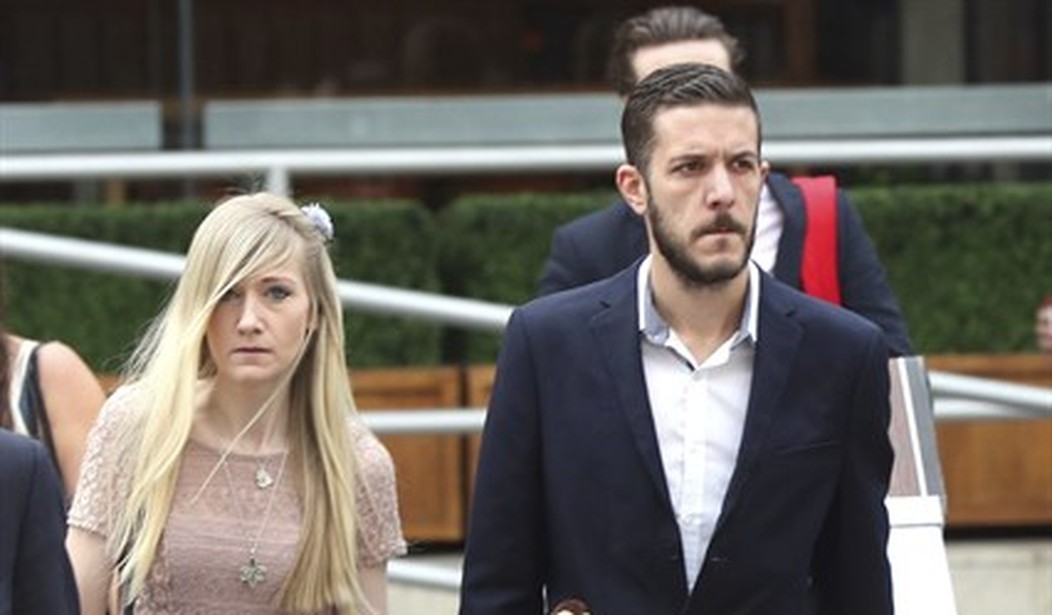The British judge that first ordered that infant Charlie Gard could not be removed by his parents to seek alternative treatment at their own expense came under fire in a new hearing prompted by a request from Great Ormond Street Hospital (GOSH). Parents Chris Gard and Connie Yates “stormed out” of the hearing after accusing Justice Nicholas Francis of mischaracterizing their earlier testimony. It’s not the only factual dispute that arose today in the Gard case, either:
The parents of baby Charlie Gard stormed out of Britain’s High Court Thursday amid an emotional hearing as they fight to take him to the United States for experimental treatment for a rare genetic disorder. …
But about two hours into Thursday’s hearing, Charlie’s parents abruptly left the court after disagreeing with a comment by the judge.
Yates interrupted Francis as he said that the parents had said they would not want to prolong Charlie’s life in its present state, only if there was hope of improvement. “I never said that!” she exclaimed from her seat behind her barrister.
The judge attempted to clarify that one or other of the parents had said it, but both rose and left the court, which paused for lunch a short time later.
The parents returned after the break to dispute evidence entered by GOSH that Charlie’s brain had stopped developing. The judge snapped back at Yates for arguing that her own measurement showed a larger circumference than that in GOSH records, but still ordered an independent evaluation ASAP:
Great Ormond Street Hospital, where Charlie is being treated, maintain there has been no skull growth – a key indicator of brain development – in the last three months whereas his parents, Connie Yates and Chris Gard, dispute official figures.
Ms Yates said she had used her own tape measure on Thursday to measure the circumference of her son’s head, claiming it is 2cm larger than GOSH had recorded. Grant Armstrong, representing Charlie’s parents, said that Ms Yates had recorded a measurement of 42.4cm.
Mr Justice Francis said: “If I’m being told the measurements being taken by a world famous hospital are wrong I have to have more evidence than you telling me. It is absurd that the science of this case is being infected by the inability to measure a child’s skull. “I want this resolved in the next 24 hours,” he told Mr Armstrong.
I have to have more than you telling me is a great way to sum up what has happened with Charlie Gard and his parents. Rather than allowing Gard’s parents to determine his care — in this case, to continue his care — GOSH, the National Health Service, and the courts have arrogated to themselves the authority to judge what is best for the child. They have alleged no abuse that would justify terminating parental authority and jurisdiction, nor have they even bothered with an intermediate step of appointing an attorney to act as a guardian ad litem in case the parents are incapable of acting in Charlie’s best interests.
The Associated Press tries to explain why this is for the children to Americans:
British judges are tasked to intervene when families and doctors disagree on the treatment of people unable to speak for themselves. The rights of the child take primacy, with the courts weighing issues such as whether a child is suffering and how much benefit a proposed treatment might produce.
“Unlike the USA, English law is focused on the protection of children’s rights,” said Jonathan Montgomery, professor of health care law at University College London. “The USA is the only country in the world that is not party to the U.N. Convention on the Rights of the Child; it does not recognize that children have rights independent of their parents.”
This case provides an excellent demonstration of why the US balked at the UN convention. Making children’s rights “independent of their parents” essentially gives the state carte blanche to inject itself into the private affairs of families. In the US, the state can act to intervene when probable cause exists to do so, and/or where the child’s life is threatened by parental abuse or neglect. In this case, though, the circumstances are flipped — Charlie’s parents want to provide him care, and the state refuses to allow anything but a course of benign neglect that will lead directly to Charlie’s death.
To call that a result of being “focused on the protection of children’s rights” is Orwellian in construction and horrifying in result. It demonstrates the wisdom of protecting the rights of parents to make decisions for their children, and to require the state to show evidence of abuse or neglect in order to vacate that authority. The Charlie Gard case shows that parents have little power to protect their children from a euthanasia-besotted culture that believes death is preferable to hardship and disability.
No decision will be forthcoming today. Based on how this hearing unfolded, don’t expect to hear good news tomorrow, though.








Join the conversation as a VIP Member